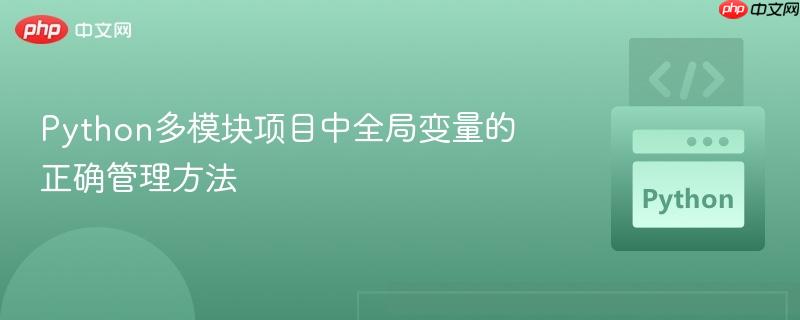
理解Python中的变量作用域与模块导入
在python中,当我们在多个模块间共享状态(如全局变量)时,变量的作用域和模块导入机制是理解问题的关键。一个常见的误区是使用from module import *或from module import variable_name来导入全局变量,并期望在导入后对该变量的修改能反映到所有其他导入它的模块中。然而,这种导入方式实际上会将变量的当前值(或引用)复制到当前模块的命名空间中。这意味着,当你在一个模块中对导入的变量进行重新赋值操作时,你实际上是在修改该模块内的“副本”,而不是原始模块中定义的全局变量。
例如,考虑以下场景:在一个Pygame应用中,我们定义了一个全局变量selectedSong来存储当前选中的歌曲。
globals.py
import pygame as Py selectedSong = None
playlist.py
from globals import * # 问题所在
import os
songs = os.listdir('./assets/songs')
def generatePlaylist(font, event):
# ... 省略部分代码 ...
selected = selection(event, rectIndexPosition, rectIndexWidth, rectIndexHeight, song)
if selected is not None:
selectedSong = selected # 这里的赋值操作实际上是在修改 playlist.py 内部的 selectedSong 副本
print(selectedSong)
# ... 省略部分代码 ...在playlist.py的generatePlaylist函数中,当用户点击选择一首歌曲后,selectedSong = selected这行代码会执行。此时,由于from globals import *已经将globals.selectedSong的值(最初是None)导入到了playlist.py的命名空间中,selectedSong = selected实际上是在playlist.py内部创建或修改了一个名为selectedSong的局部变量(如果它在函数内部)或者模块级变量(如果它在模块顶层)。它并没有修改globals.py中定义的那个原始的selectedSong。
立即学习“Python免费学习笔记(深入)”;
因此,当其他模块(如buttonMusic.py)也通过from globals import *导入selectedSong时,它们获取的依然是globals.py中未经修改的原始值(即None),而不是playlist.py中更新后的值。
buttonMusic.py
from musicFunction import *
from globals import * # 同样的问题
def playButton(event):
if event.type == Py.MOUSEBUTTONDOWN:
# ... 省略部分代码 ...
print(selectedSong) # 这里的 selectedSong 仍然是 None
if selectedSong is not None:
play()这就是为什么在playlist.py中print(selectedSong)会显示更新后的歌曲名,但在buttonMusic.py中print(selectedSong)却始终显示None的原因。

CPWEB企业网站管理系统(以下称CPWEB)是一个基于PHP+Mysql架构的企业网站管理系统。CPWEB 采用模块化方式开发,功能强大灵活易于扩展,并且完全开放源代码,面向大中型站点提供重量级企业网站建设解决方案。CPWEB企业网站管理系统 2.2 Beta 测试版本,仅供测试,不建议使用在正式项目中,否则发生任何的后果自负。
解决方案:直接导入模块并引用
要解决这个问题,我们需要确保所有模块都引用并修改同一个selectedSong变量实例。最直接有效的方法是导入整个globals模块,然后通过globals.selectedSong的形式来访问和修改变量。这样,无论哪个模块进行操作,都是在操作globals模块命名空间下的那个唯一变量。
1. globals.py (保持不变)
import pygame as Py selectedSong = None
2. playlist.py (修改导入和变量访问方式)
import globals # 直接导入 globals 模块
import os
import pygame as Py # 确保 Pygame 也被导入,如果需要
songs = os.listdir('./assets/songs')
def generatePlaylist(font, event):
for index, song in enumerate(songs):
rectIndex = Py.Rect(20, 25 + (50 * (index + 1)), 260, 40)
rectIndexPosition = (20, 25 + (50 * (index + 1)))
rectIndexWidth = 260
rectIndexHeight = 40
Py.draw.rect(screen, 'gray', rectIndex)
text_surface = font.render(song, True, (0, 0, 0))
text_rect = text_surface.get_rect(center=rectIndex.center)
screen.blit(text_surface, text_rect)
selected = selection(event, rectIndexPosition, rectIndexWidth, rectIndexHeight, song)
if selected is not None:
globals.selectedSong = selected # 通过 globals.selectedSong 访问并修改
print(globals.selectedSong) # 打印验证
# ... 省略部分代码 ...
def selection(event, rectIndexPosition, rectIndexWidth, rectIndexHeight, song):
if event.type == Py.MOUSEBUTTONUP:
if rectIndexPosition[0] <= event.pos[0] <= rectIndexPosition[0] + rectIndexWidth and \
rectIndexPosition[1] <= event.pos[1] <= rectIndexPosition[1] + rectIndexHeight:
return(song)
return None3. buttonMusic.py (修改导入和变量访问方式)
from musicFunction import *
import globals # 直接导入 globals 模块
import pygame as Py # 确保 Pygame 也被导入,如果需要
# 假设 imagePlayPosition 和 imagePlay 在其他地方定义并可访问
# 例如,如果它们也是全局变量,则可能需要从 globals 导入或通过参数传递
def playButton(event):
if event.type == Py.MOUSEBUTTONDOWN:
if imagePlayPosition[0] <= event.pos[0] <= imagePlayPosition[0] + imagePlay.get_width() and \
imagePlayPosition[1] <= event.pos[1] <= imagePlayPosition[1] + imagePlay.get_height():
print(globals.selectedSong) # 通过 globals.selectedSong 访问
if globals.selectedSong is not None:
play()通过这种方式,playlist.py中的generatePlaylist函数通过globals.selectedSong = selected修改的是globals模块中的selectedSong变量。当buttonMusic.py中的playButton函数通过globals.selectedSong访问时,它将读取到playlist.py中更新后的值。
注意事项与最佳实践
- *避免`from module import **: 除非你非常清楚其副作用且只在特定场景下使用(如交互式shell),否则应尽量避免使用from module import *`。它不仅容易导致命名冲突,更重要的是,在处理可变状态时容易产生上述的副本问题。
- 明确的变量访问: 使用module.variable_name的形式访问全局变量,这使得代码更清晰,一目了然地表明变量的来源,也更容易追踪变量的修改。
-
全局状态管理: 尽管直接导入模块是一种有效的解决方案,但在大型或复杂的应用中,过度依赖全局变量可能导致代码难以维护和测试。考虑使用以下替代方案来管理应用程序状态:
- 类(Class): 将相关的状态和操作封装到一个类中。可以创建该类的一个实例,并将其作为参数传递给需要访问状态的函数或方法。这是管理复杂状态和行为的推荐方式。
- 配置对象: 对于只读的全局配置,可以创建一个配置对象或字典,并将其作为单一入口点。
- 依赖注入: 对于更高级的场景,可以考虑使用依赖注入模式来提供所需的服务和状态。
总结
正确管理Python多模块项目中的全局变量是避免意外行为和提高代码可维护性的关键。理解from module import *的工作原理,即它会创建变量的副本而非共享引用,是解决这类问题的起点。通过直接导入模块并使用module.variable_name的形式来访问和修改全局变量,可以确保所有模块操作的是同一个变量实例。虽然这种方法解决了当前问题,但对于更复杂的应用,建议进一步探索使用类或其他设计模式来更好地封装和管理应用程序的状态。





























